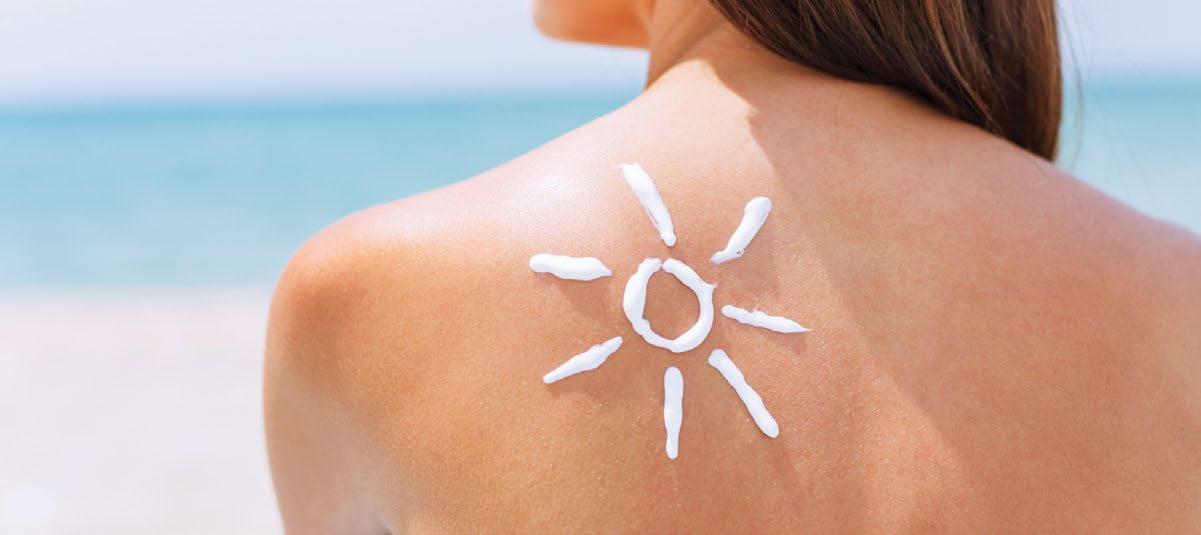
3 minute read
It’s Never Too Late to Protect Yourself from Sun Damage
It’S nEvER too LatE to
pROTECT yOURSElFFROm SUn DAmAgE
Advertisement
Expert Advice from Bermuda Cancer & Health Centre
As people age, they tend to think that sun damage to their skin has been done and forgo the need for sunscreen, however sun damage isn’t a finite thing. By continuing to leave your skin unprotected, you risk pushing your immune system past its breaking point. This is when your immune system fails to repair mutations, and skin cancer begins. Leaving your skin unprotected also speeds up the aging process making you look older, faster, and remember, skin cancer does not discriminate when it comes to skin colour. Sunscreen is an essential tool in the fight against skin cancer, including melanoma, the deadliest form. However, with that said all sunscreens are not created equally. A 2019 report from Environmental Working Group (EWG) found that nearly two-thirds of sunscreens don’t work and contain concerning ingredients that are readily absorbed by the body. A recent study found that sunscreen chemicals hit the bloodstream within a day of using them, and at levels high enough to prompt government investigations on safety. So, it’s time to put some damage limitation into effect - no matter your age.
HERE’SWHat tHE SkIn CanCER FounDatIon ADVISESOn STAyIng SAFEIn THESUn;
1. Seek the shade, especially between 10am and 4pm 2. Do not let your skin burn 3. Avoid tanning and never use UV tanning beds 4. Cover up with clothing, including a broad-brimmed hat and UVblocking sunglasses 5. Use a broad spectrum (UVA/UVB) sunscreen with an SPF of 30 or higher every day.
FOllOw THESESImplE gUIDElInES wHEn SElECTIng yOURSUnSCREEn:
CHOOSIng ASUnSCREEn
Choose a sunscreen that has an SPF of 30, is water resistant, and provides broad-spectrum coverage, which means it protects you from UVA and UVB rays. Choose a mineral-based sunscreen, this sunscreen WORKS LIKE A SHIELD; it sits on the surface of your skin, deflecting the sun’s rays. Look for the active ingredients of ZINC OXIDE and TITANIUM DIOXIDE. Opt for this sunscreen if you have sensitive skin.
wHATTOAVOID
Chemical sunscreens which contain the following active ingredients: oxybenzone, avobenzone, octisalate, octocrylene, homosalate and octinoxate, Vitamin A (retinyl palmitate) and insect repellent. The Environmental Working Group and other toxicology experts believe that these are linked to hormone disruptions and potentially to cell damage that may lead to skin cancer. Also, avoid products such as sprays and powders as they are inconsistent. Breathing in chemicals can be harmful and SPF 50 and above contain more chemicals than protection.
HOw TO Apply
Most adults need about one ounce of sunscreen, ENOUgH TO FILL A SHOT gLASS, to fully cover their body. Sunscreen can protect your skin against skin cancer and premature aging, however, it is not as effective unless it’s applied correctly. Apply sunscreen generously before going outdoors, especially before going swimming. It takes approximately 20 minutes for your skin to absorb the sunscreen and protect you. If you wait until you are in the sun or in the water to apply sunscreen, your skin is unprotected and can burn. Apply sunscreen to all bare skin. Remember your neck, face, ears, the top of your feet and legs, front and back. For hard‐to‐reach areas like your back, ask someone to help you. If you have thinning hair, either apply sunscreen to your scalp and wear a wide‐brimmed hat. To protect your lips, apply a lip balm with an SPF of at least 15. To remain protected when outdoors, reapply sunscreen every two hours, or immediately after swimming or sweating. People who get sunburned usually didn’t use enough sunscreen, didn’t reapply it after being in the sun or used an expired product. Your skin is exposed to the sun’s harmful UV rays every time you go outside, even on cloudy days and in the winter. So whether you are at home in your garden, on the boat or partaking in public holiday events or out getting a little exercise, remember to use sunscreen.

